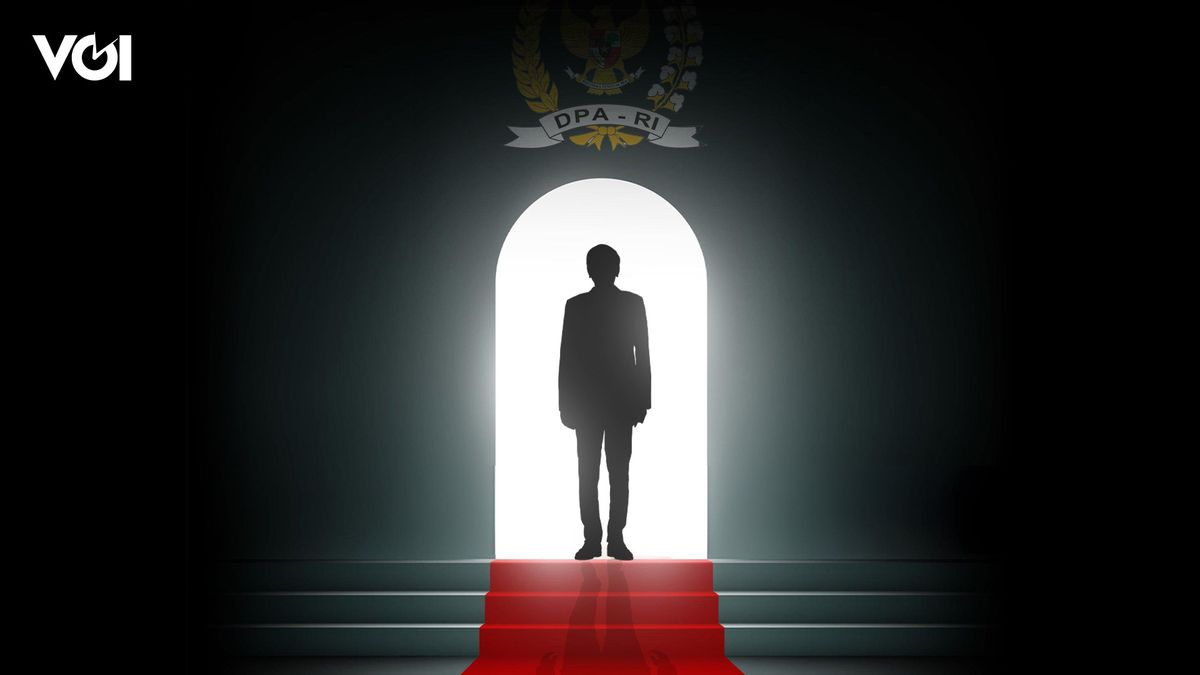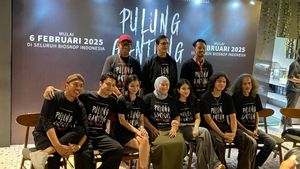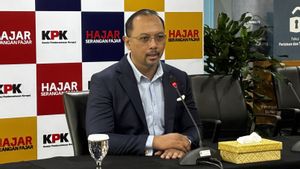JAKARTA – Public memory seems to re-imagine the days of Soeharto's government in the New Order era, after the DPR RI planned to change the nomenclature of the Presidential Advisory Council (Wantimpres) to become the Supreme Advisory Council (DPA).
The change in nomenclature itself is contained in the revision of Law (UU) Number 19 of 2006 concerning the Presidential Advisory Council (Wantimpres), which was approved as an initiative proposal by the DPR RI. In fact, the revision of Law 19/2006 is not included in the priority National Legislation Program.
Constitutional law expert Refly Harun believes that the nomenclature of the Presidential Advisory Council should not need to be changed to the Supreme Advisory Council as stated in the revision of the Wantimpres Law.
According to him, the DPA had a negative connotation during the New Order era, where the DPA was often dismissed as the Supreme Pensionary Council because it was considered useless.
"If we still use the nomenclature of the Supreme Advisory Council, we are worried that people will think the same as the previous Supreme Advisory Council," he said, Sunday 14 July 2024.
Refly explained that the DPA in the New Order era was one of the state institutions that was abolished after the fourth amendment to the 1945 Constitution. Before it was abolished, the DPA was detailed in a separate chapter in the constitution, where the DPA was regulated parallel to the president.
Apart from that, he also highlighted the removal of restrictions on the number of Wantimpres members. This makes it seem as if President Joko Widodo (Jokowi) gave Prabowo Subianto a blank check so he could recruit people who were not already in the cabinet.
Refly said that the revision of the Wantimpres Law was one of many policies that indicated a return to the New Order era. He gave examples of plans to form new ministries and efforts by the central government to withdraw matters handled by the regions.
“For example, mining affairs are said to have a lot of corruption there. Instead of providing supervision and enforcement, the government has taken over the process. Now we seem to be repeating the romance of the New Order," he said.
A similar view was expressed by constitutional law expert at the Jentera Indonesian College of Law (STH), Bivitri Susanti, who said the idea of reviving the DPA was a step to return to the New Order era.
Because, before the amendments to the 1945 Constitution were made, the DPA was contained in the constitution, but now it has been removed after the amendments in 2004. "It's really like going back to the New Order era," she added.
She reminded that during the transition from the New Order to Reformation, the rejection of the DPA was conveyed by civil society and legal experts, such as Jimly Asshiddiqie, Bagir Manan, and Sri Soemantri, who agreed to tidy up the constitutional system where there were no longer institutions with too high a level and the authority is not significant.
During the New Order era, continued Bivitri, the DPA did not have an important function, apart from providing advice to the president. Therefore, the urgency of changing the Wantimpres to become a DPA initiated by the DPR must be questioned.

The formation of the DPA violates the Constitution
Meanwhile, constitutional law expert Feri Amsari believes that the change in the Wantimpres nomenclature to DPA contained in the revised draft of the Wantimpres Law violates the constitution and is contrary to the spirit of reform.
He explained that Chapter 4 of the 1945 Constitution as an amendment had eliminated the existence of the DPA as an efficiency and effectiveness measure to purify the presidential system implemented in Indonesia.
"Instead, the president through law is given the authority to form a Wantimpres which is under the authority of the president or part of the presidential staff at the State Palace," he said.
Feri said that the proposed change in the nomenclature of Wantimpres to DPA seemed odd. Moreover, this was done near the end of President Joko Widodo's term of office. Because of this, the current suspicion is that Jokowi wants the position of Chairman of the DPA after stepping down as president.
"Especially if changes are made that result in the DPA no longer being under the authority of the president, but becoming its own institution," he added.
He emphasized that the DPA proposal put forward by the DPR Baleg was not in accordance with the 1945 Constitution, and tended to violate and conflict with the constitution. Apart from that, the existence of a DPA has the potential to endanger the next president because his power will no longer be refined.
"Jokowi's political steps at the end of his term of office are very contrary to the 1945 Constitution. Moreover, the DPA proposal makes the laws collide with each other and the constitution," said Feri Amsari.
Researcher at the Anti-Corruption Study Center at Mulawarman University, Herdiansyah Hamzah, also questioned the legal basis for re-establishing the DPA outside the presidential body. He emphasized that the formation of the DPA did not have a strong legal basis in the constitution even though previously this institution had been specifically regulated in Chapter IV of the 1945 Constitution.
The constitutional law expert said that an institution that helps the president should be within the presidential institution, not stand alone as a special institution. "After the reform, the DPA changed to Wantimpres and the position of the advisory council is under the executive branch of power," he said.
Executive Director of Indonesia Political Opinion (IPO), Dedi Kurnia Syah hopes that the change in the nomenclature of Wantimpres to DPA will not become an arena for accommodative politics. According to him, there is no relevance of the change in nomenclature. Apart from that, if you only change the name, then the DPA's duties are not far from the current duties of the Wantimpres.
"Because it will only be a political gimmick and a way to pay back the figures who won the presidential election. DPA will be similar to ambassadors, commissioners of state companies, which so far have been mostly occupied by political volunteers," said Dedi.

DPA is considered to perpetuate Joko Widodo's power
On the other hand, political and national observer, M Rizal Fadillah, considers the change in the Wantimpres nomenclature to DPA as an effort to find a place for Joko Widodo in order to "extend his term of office" as his dream.
He stated that this step seemed to fool the DPR because the DPA was an institution in the old 1945 Constitution which the MPR had abolished through a Constitutional Amendment. Therefore, the desire to reinstate the DPA must go through the MPR Amendment mechanism again.
“This means that this matter is not the authority of the DPR. Apart from that, the revision of the Wantimpres Law must be oriented towards increasing the function of 'advice' or 'consideration' to the President. Don't be like now where Wantimpres is only a forum or 'museum' institution for the nation's elders," he explained.
Rizal emphasized that if he intends to revive the DPA as a High State Institution, the only way is through another amendment to the 1945 Constitution or returning to the original 1945 Constitution. “That's the work of the MPR. If the revision of Law no. 19 of 2006 is forced to then place the DPA on an equal footing with the President, then there will be a flood of Judicial Reviews for the Exemption of Laws which are deemed to be contrary to the constitution," he added.
Former Chief Justice of the Constitutional Court, Mahfud MD, believes that the proposal to reactivate the DPA to accommodate President Jokowi after his retirement is too excessive. This is because the current constitutional structure is sufficient and the DPA itself, based on the results of the study, was deemed ineffective so it was removed during reform.
"In my opinion, reviving the DPA is too excessive, only for one person and then creating its own state institution which is considered inappropriate and then reviving it," he said.
According to Mahfud, the current position of Wantimpres is quite good because it is able to make suggestions to the president directly and flexibly without going through intermediaries. "There's no need to reactivate it, the DPA has been disbanded based on the results of a study that was previously deemed ineffective. Just go ahead if Jokowi wants to go there (Wantimpres)," he continued.
President Jokowi himself does not want to bother responding to the DPR's steps to revise the Wantimpres Law and change the nomenclature to DPA. According to him, this is the domain of the DPR, although it will later be discussed and approved with the government.
The President said that the amendment to the Wantimpres Law was an initiative of the DPR so that it could happen in parliament. Meanwhile, the revision has become controversial because it is outside the Prolegnas agenda. “That's an initiative from the DPR. Ask the DPR," said Jokowi.
The English, Chinese, Japanese, Arabic, and French versions are automatically generated by the AI. So there may still be inaccuracies in translating, please always see Indonesian as our main language. (system supported by DigitalSiber.id)










